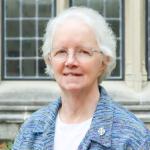Do you know the surprising origins of Mother's Day?
Back in the 19th century, the holiday began as a way to support mothers who had lost children in the Civil War. In fact, a common activity at the time was the meeting of groups of mothers whose sons had fought or died on opposite sides of the war.
It is striking to think about those mothers of many years ago, who gathered in community to heal from their tragic losses.
Even today, Mother’s Day can be an occasion for deep pain for many mothers — especially those who have lost children to violent crime or the criminal legal system.
But in a spirit similar to that of the mothers of the Civil War era, a group of mothers in Chicago comes together to heal from losses they have sustained due to crime, violence, and incarceration in their community.
I recently had an extended discussion with Sr. Donna Liette, CPPS, who ministers at Precious Blood Ministry of Reconciliation (PBMR), a Catholic restorative justice ministry in Chicago’s Back of the Yards neighborhood.
Sr. Donna told me that “behind every life taken by violence or incarceration kneels a grieving mother.” Over the past 12 years, Sr. Donna has been in contact with over 100 grieving women like this through PBMR’s Family Forward Program.
The program is dedicated to helping women heal from the loss of a child — many to violent crime or incarceration.
Using peacemaking circles, which are a foundational practice of restorative justice, the mothers come together in a safe space to share stories of their loved ones, to laugh and cry, and to journey together toward healing.
Healing, of course, looks different for each of the participants in the “Mother’s Circle.” One participant, for instance, has a son who was sentenced to “die in prison” for a double homicide that occurred when a bullet shot at a van ricocheted and killed two girls. This mother, while still grieving for that son, struggles to care for her other two children. But in the Mother’s Circle, she is able to find solidarity and community with other women who have experienced similar hardships.
In addition to providing a space for healing and community-building, the Family Forward Program also looks for ways to meet participants’ other needs. For instance, after the program identified affordable housing among the biggest issues for its members, PBMR established Sankofa Home which provides transitional housing for women.
PBMR also works creatively to respond to the individual needs of the women. A recent example was a weekend respite at a hotel for a mother whose life is consumed with caring for a son who is paralyzed from gun violence.
In the Family Forward Program, stories of hope abound. One woman, faced with the fact that her son received a three-year prison sentence, resolved that she would spend those three years in law school. She now is able to assist some of the other mothers with legal issues they are facing.
“This is not a path that should be walked alone,” Sr. Donna told me, “so we find strength in being in relationship with one another.”
This Mother’s Day, let us pray for all mothers walking the path of healing and, in the spirit of Sr. Donna and PBMR, let us also seek to accompany them so that they do not have to walk alone.


